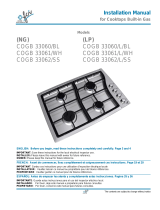
Cooktop Installation Manual
ENGLISH
10
Gas Requirement
A QUALIFIED SERVICE MAN OR GAS APPLIANCE
INSTALLER MUST MAKE THE GAS SUPPLY
CONNECTION.
Leak testing of the appliance shall be conducted by
the installer according to the instructions given.
WARNING
If the line pressure supplying the appliance pres-
sure regulator exceeds 14 inches W.C. (any gas),
an external regulator must be installed in the gas
line ahead of the appliance regulator to reduce the
pressure to no more than 14 inches W.C. Failure
to do this can result in malfunction and damage to
the appliance.
Important Notes for Gas Connection
The appliance and its individual gas shutoff valve
must be disconnected from the gas supply piping sys-
tem during any pressure testing of that system at test
pressures in excess of 1/2 psi (3.5 kPa).
The appliance must be isolated from the gas supply
piping system by closing its individual manual shut-off
valve during any pressure testing of the gas supply
piping system at test pressures equal to or less than
1/2 psi (3.5 kPa).
All supply piping, except as noted, should use com-
mon National Pipe Thread (N.P.T.). For all pipe con-
nections use an approved pipe joint compound resis-
tant to the action of LP gas.
This appliance is designed for use with NG gas or LP
gas.
The gas pressure regulator is supplied with this appli-
ance. It must be installed in the gas way ahead of the
manifold entrance. It is pre-set for use with natural
gas. To use it with different gas it must be converted,
as described in the Gas conversion paragraph (see
figure 17 and 18).
If at any time the appliance is to be used with a differ-
ent type of gas, all the conversion adjustments must
be made by a qualified technician before attempting
to operate the cooktop on that gas.
The gas should be supplied to the appliances pres-
sure regulator, at line pressure between 6 and 14
inches of water column for NG, and between 11 and
14 inches of water column for LP.
Important:
NEVER REUSE OLD CONNECTORS WHEN IN-
STALLING THIS COOKTOP.
To reduce the likelihood of gas leaks, apply teflon
tape or a thread compound approved for use with
LP or Natural gases to all threaded connections.
Apply a non-corrosive leak detection fluid to all
joints and fittings in the gas connection between
the supply line shut-off valve and the cooktop
inlet.
Check for leaks!
Bubbles appearing around fittings and connec-
tions will indicate a leak. If a leak appears, turn off
supply line gas shut-off valve, tighten connections,
turn on the supply line gas shutoff valve, and re-
test for leaks. Never test for gas leaks with an
open flame.
NEVER TIGHTEN TO MORE THAN 35 ft lbs OF
TORQUE.




















